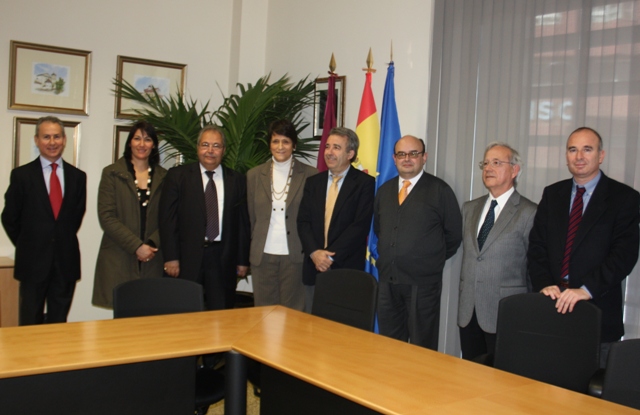Collaboration agreement between the Foundation IEA and IME for the development of joint actions on water resources.
In a ceremony presided by the Hon. Mr. Regional Minister of Agriculture and Water, Antonio Cerdá, the Euro Mediterranean Water Institute Foundation (Foundation IEA) and the Mediterranean Water Institute (IME), based in Marseille (France) have signed on February 23, 2010 a collaboration framework agreement, whereby both organizations will develop collaborative actions in the interest of research in water resources management.
The IME is dedicated to the cooperation development between local authorities and water professionals in the Mediterranean region, and will export experience and technology used in the Autonomous Community of Murcia to manage and exploit this natural resource, proposing it as a model for other countries in the Mediterranean. This was acknowledged by Hachmi Kennou, Chairman of EMI, when he alluded to the objective of the Agreement adopted, noting that the Region of Murcia "was very poorly developed 30 years ago" and that the current development "demonstrates that the model of the autonomous region is a model that can be exported and be useful to southern and eastern Mediterranean countries, not only technical aspects but also on what has to do with environmental impact." He also noted that "the treatment and reuse of water, saving and optimization of technology implementation in the Region of Murcia can be very useful in Mediterranean countries."
Similarly, Mr. Kennou highlighted the importance of water transfers and, although he said that currently this is more a political than technical issue, he stated that it would be understandable to do water transfers to SE Spain from other basins. This idea was reaffirmed when he saw the Campo de Cartagena and checked the effects of the Tajo-Segura Canal, so Mr. Kennou said that this region is a model that could be transferred to the south and eastern Mediterranean.
The Regional Minister of Agriculture and Water emphasized that the Agreement, which opens a new line of cooperation, will serve to "formalize and define" specific action to carry out research and advise on problems related to water management in deficit areas in the Mediterranean, laying the groundwork for the joint development of different format activities like applying to European projects, studies, training and spreading, and joint counseling interesting for both parties in all aspects of the efficient use of water resources.
He also recalled the great experience of the Region of Murcia in using and saving water and highlighted its integrated management model, predicting that it will eventually be exported to other regions. He also noted that the purification systems in the region reached levels well above those required by European standards, having allowed to clean up the Segura river -in the words of the Minister- now the least polluted river in Spain, despite its low flow.
Finally the Minister referred to the modernization of irrigation, indicating that in the Region of Murcia reaches 85 percent of the irrigable area and that, with drip irrigation systems centralized through computers and even mobile phone, this management allows the Region of Murcia to export 20% of fruits and vegetables of Spain by using only 3.4% of the water in the country.
The Director of the IEA Foundation, Francisco Cabezas brought out that the Region of Murcia is a laboratory for experimenting with problems related to water scarcity, both in terms of quality and quantity of this natural resource, as this Region is a collection of problems related to floods, droughts, pollution of wastewater and groundwater, so the results achieved by the Agreement can be shared with countries that suffer the same scarcity problems.


